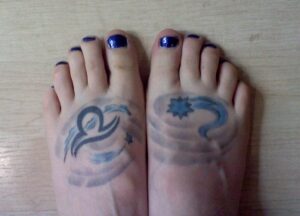
I got an interesting email from a friend over the weekend. He just graduated from law school and is studying for the bar. He’s also training for an ironman race. He’s been in fabulous shape for as long as I’ve known him and his preferred running outfit is teeny tiny running shorts and sneakers. He doesn’t put a shirt over his tattooed chest. When he was in school he lived near campus but now he lives downtown near the courthouses and a lot of the big law firms. He was concerned that his running attire could have a negative impact on his career if judges and lawyers saw him. He wrote to me asking for my thoughts.
I told him the same thing I tell everyone: “Don’t do anything in public that you wouldn’t put on the front page of the paper.†If you’re ok with being seen shirtless and in little shorts in the newspaper, why would you have a problem with judges and lawyers seeing you? They’re just people. And who’s to say they haven’t already seen you? Most people are so oblivious that they wouldn’t figure out that you were the shirtless guy if they met you at a professional event.
My friend’s question made me reflect on my early days as a law student. I was told that I should change my clothes, my hair, and even my sunglasses before I started law school. I took out my excess piercings and kept the tattoos on my feet covered with shoes, dark socks, and tattoo concealer. I gave all that up and was back to being 100% myself by the end of my 2L year. I was happier for it and got more professional opportunities as a result of being me instead of trying to fit the law student mold.
Why are lawyers seemingly held to a different social standard than other people? When we graduate from law school, we don’t suddenly all become interested in golf, going to tea, or smoking cigars. Lawyers should never give up their personality or interests because they’re lawyers. I see nothing wrong with a lawyer being a shirtless runner in their free time, or even something more daring like a burlesque dancer or a nudist. It’s no more shocking than any other fringe activity like having extreme religious beliefs or seeing your favorite band live in concert 33 times. As long as you’re not hurting anyone or breaking the law, let your freak flag fly!
I can see where my friend might be concerned because he doesn’t have a job lined up after the bar. Bug here’s something else to think about – if you have to hide who you are to get a job, is it a job you really want? I’m not saying that you should flaunt your eccentricities, but you shouldn’t have to hide them either.
The only other advice I can offer of this topic is the wisdom that was bestowed upon me by my friend Evo Terra. He said to figure out whose opinions truly matter to you and then don’t give a shit about what anyone else thinks. It’s easier said than done, but those are definitely words to live by.



